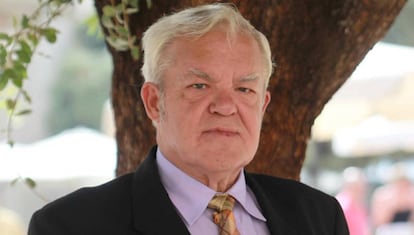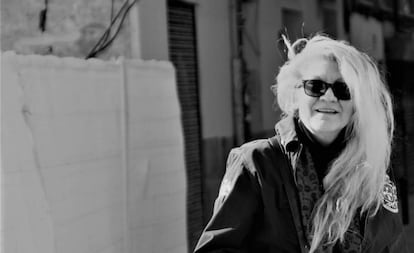38 years later, a mysterious murder could be about to be solved in Spain
A German-born writer who is now 74 will stand trial for killing a young woman and her unborn child after DNA tests allowed investigators to identify an unclaimed body

When they were four and five years old, sisters Josefa and Carmen Fraile Muñoz swore that they would always stay together and never let anybody else hurt them again. Their parents had abandoned them after their divorce. But unbeknownst to the girls at the time, fate had more pain in store for them.
In late 1981 Carmen, who was then 24, traveled from Madrid to Barcelona in the company of a German-born writer and translator who lived near the Spanish capital. She went missing and was never heard from again.
Lab results confirm that the suspect was the father of the child that Carmen was carrying when she was killed
Josefa, her older sister, searched all over for her. But no news emerged until 36 years later, in 2017, when a Madrid court sent out a sample of Josefa’s DNA to check against police databases. This was done so that her father, who is still alive, could write his will – a move that required an official declaration of death for Carmen, the missing sibling.
As a result, officers at a police station in Manresa, in Barcelona province, realized that Josefa’s DNA matched that of the body of a pregnant woman whose identity had remained a mystery for 20 years. The corpse had been accidentally found in 1999 during construction work in the garden of a private home in Sant Salvador de Guardiola, in Barcelona province. The police were unable to identify the victim at the time, but they kept a genetic sample.
Nearly two decades later, the body turned out to be that of Carmen Fraile Muñoz. There was a gunshot wound at the base of her skull, and inside the skeleton the police found the remains of a six-month-old fetus.

Now, 38 years after Carmen’s disappearance, a Manresa judge is targeting a 74-year-old man named Manuel Macarro Thierbach, a German-born novelist who lives in Spain. According to court documents seen by EL PAÍS, the man is being accused of homicide and abortion.
Josefa was taken in by her paternal grandmother, while Carmen ended up in a boarding school
According to Judge Pedro Cerviño, Macarro allegedly shot Carmen, then buried her body in the garden of the rented home that the couple lived in for a few days after traveling from Madrid in a Seat 124 car.
The writer will stand trial, although there is some concern that the crimes are about to exceed the statute of limitations. The Manresa judge had Macarro arrested a year ago, when the DNA match was found, then released him after ordering a paternity test. The lab results confirmed that he is the father of the child that Carmen was carrying when she was killed.
A tragic childhood
Josefa, who is now 64, did not want to die without finding out what happened to her sister. They had shared a broken childhood after their parents split up and abandoned them. Josefa was taken in by her paternal grandmother, while Carmen ended up in a boarding school. Years later, the father returned from abroad with a new partner, and took charge of them. But his daughters no longer wanted anything to do with him.
Angélica Albor, Josefa’s daughter, says that in 1981 her aunt Carmen had found a job and moved into an apartment in the area of Huertas, in downtown Madrid. One day, she showed up “looking very nervous” at Josefa’s workplace. “She looked unkempt, she kept crying and she looked pregnant,” said Josefa in statements to the judge. Josefa told Carmen to wait for her until after work. But that was the last time she ever saw her sister.

There was a postcard some time after that, supposedly from Carmen, saying she was in Barcelona. At least that is what Josefa was told, although she never read the missive. She assumed Carmen had gone to Barcelona with Manuel Macarro. Josefa and her own partner at the time, Antonio Ampuero, had introduced Carmen to Macarro, who was then married and living with his wife and three children in Móstoles, where he made a living as a translator. Years later, Macarro wrote a book retelling the horrors of his own life, which began at a German concentration camp in 1945.
Josefa’s then-partner imported dogs from Germany, and he had hired Macarro to translate the animal guides into Spanish. The two men became friends, and one day the writer asked Ampuero if he knew any girls that he could introduce him to. A date was arranged at Carmen’s house. Josefa and Antonio stayed in the living room, while Carmen and Manuel Macarro went into the bedroom, where they had sexual relations, according to the court statement.
When Carmen went missing, Josefa assumed that she had gone to Barcelona with the writer. Time went by and there were no signs of her. Josefa was told not to worry, that people sometimes move to a different place to forget their past. Josefa did not file a missing person report.
The judge has concluded that probable cause exists that Macarro killed Carmen because she was pregnant, while he was a married man with three children of his own
When she finally did, it was in 2017. It was then that the police took samples of her and her father’s DNA. Also that year, a Madrid court opened proceedings in connection with the father’s will. Josefa told this court that the last time she saw her sister alive was in 1981, and she named Manuel Macarro as a person who had had a relationship with her sister at the time.
The judge located Macarro in Barcelona and asked him about María del Carmen Fraile Muñoz. He sent back a written reply stating that he had “never heard of her.” But Macarro was arrested in December 2018, when the mysterious body was identified as Carmen’s. This time, the writer admitted to the judge that he and Carmen had traveled together to Barcelona in late 1981, and spent several days at a rental house in the countryside.
He said he then went back to Madrid to pick up his family and bring them to Barcelona. By then, he and Carmen had allegedly agreed that she would be gone. Macarro said he didn’t know Carmen was pregnant. But the judge did not believe him, and noted that the writer lived in the Barcelona house with his family for just a few months, then kept moving to different locations, as though to avoid being found.
The investigating judge has concluded that probable cause exists that Macarro killed Carmen because she was pregnant, while he was a married man with three children of his own. His hearing will take place on December 17.
Josefa is now awaiting the ruling. Legally, only her father can ask for Carmen’s remains to be transferred to Madrid for reburial. “He hasn’t done so; his will says that her body should stay in Manresa,” says Angélica, Josefa’s daughter. “When the trial is over, we’ll see what we do about my aunt Carmen and my cousin.”
English version by Susana Urra.
Tu suscripción se está usando en otro dispositivo
¿Quieres añadir otro usuario a tu suscripción?
Si continúas leyendo en este dispositivo, no se podrá leer en el otro.
FlechaTu suscripción se está usando en otro dispositivo y solo puedes acceder a EL PAÍS desde un dispositivo a la vez.
Si quieres compartir tu cuenta, cambia tu suscripción a la modalidad Premium, así podrás añadir otro usuario. Cada uno accederá con su propia cuenta de email, lo que os permitirá personalizar vuestra experiencia en EL PAÍS.
¿Tienes una suscripción de empresa? Accede aquí para contratar más cuentas.
En el caso de no saber quién está usando tu cuenta, te recomendamos cambiar tu contraseña aquí.
Si decides continuar compartiendo tu cuenta, este mensaje se mostrará en tu dispositivo y en el de la otra persona que está usando tu cuenta de forma indefinida, afectando a tu experiencia de lectura. Puedes consultar aquí los términos y condiciones de la suscripción digital.








































